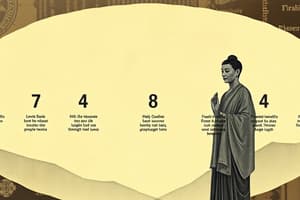Podcast
Questions and Answers
The Eightfold Path is deemed authoritative by which group?
The Eightfold Path is deemed authoritative by which group?
- Westernized Buddhists
- Zen Buddhists exclusively
- Only monastic practitioners
- All Buddhists (correct)
What is a primary aim of the Vinaya rules according to Conze?
What is a primary aim of the Vinaya rules according to Conze?
- Encouraging material attachment
- Promoting complex lifestyles
- Providing conditions for meditation and renunciation (correct)
- Enhancing social engagement
In which aspect of the Eightfold Path does one focus on understanding reality?
In which aspect of the Eightfold Path does one focus on understanding reality?
- Samma Ditthi (correct)
- Samma Vayama
- Samma Sati
- Samma Samadhi
What is NOT a common criticism of the Eightfold Path?
What is NOT a common criticism of the Eightfold Path?
Which of the following phrases best represents 'Samma Sankappa'?
Which of the following phrases best represents 'Samma Sankappa'?
Which aspect of meditation is described as achieving a detached focus?
Which aspect of meditation is described as achieving a detached focus?
What concept is associated with the cultivation of a non-attached perspective, as noted by Bhikku Bodhi?
What concept is associated with the cultivation of a non-attached perspective, as noted by Bhikku Bodhi?
Flashcards
What are the three components of the Eightfold Path?
What are the three components of the Eightfold Path?
The Eightfold Path (also known as the Threefold Trainings) outlines the steps towards enlightenment, comprised of three parts: Morality, Wisdom, and Meditation.
Define Samma Vaca (Right Speech).
Define Samma Vaca (Right Speech).
Avoiding harmful words, utilizing positive and compassionate communication. This entails speaking kindly and truthfully.
Define Samma Kammanta (Right Action).
Define Samma Kammanta (Right Action).
Avoiding harmful actions, focusing on positive actions benefiting others. This emphasizes avoiding harmful professions like butchery.
Define Samma Ajiva (Right Livelihood).
Define Samma Ajiva (Right Livelihood).
Signup and view all the flashcards
Define Samma Ditthi (Right View).
Define Samma Ditthi (Right View).
Signup and view all the flashcards
Define Samma Sankappa (Right/Directed Thought).
Define Samma Sankappa (Right/Directed Thought).
Signup and view all the flashcards
Define Samma Vayama (Right Effort).
Define Samma Vayama (Right Effort).
Signup and view all the flashcards
Define Samma Sati (Right Mindfulness).
Define Samma Sati (Right Mindfulness).
Signup and view all the flashcards
Define Samma Samadhi (Right Concentration).
Define Samma Samadhi (Right Concentration).
Signup and view all the flashcards
How does the Eightfold Path act as a 'Middle Way?'
How does the Eightfold Path act as a 'Middle Way?'
Signup and view all the flashcards
Study Notes
Key Concepts of the Eightfold Path
- The Eightfold Path, also known as the Threefold Trainings (Morality, Wisdom, and Meditation), is outlined in the Fourth Noble Truth.
- Each step of the path, starting with 'samma' (correct/right), is interlinked and essential for achieving positive karma.
- The path is not sequential, steps can be practiced concurrently.
Trainings of Morality
- Samma Vaca (right speech): Focuses on avoiding harmful/negative words and using positive, helpful language towards others.
- Samma Kammanta (right action): Requires avoiding harmful actions and promoting positive actions.
- Samma Ajiva (right livelihood): Choosing a livelihood that causes no harm (e.g., not a butcher, poison seller) and instead benefits others.
Trainings of Wisdom
- Samma Ditthi (right view): Understanding reality in a comprehensive way (e.g., through lakshanas, pratityasamutpada, skandhas).
- Samma Sankappa (right/directed thought): Directing one's thoughts toward purity, wholesomeness, and benefit.
Trainings of Meditation
- Samma Vayama (right effort): Determined effort to develop a positive mindset and overcome negative mental states (‘Three Poisons’).
- Samma Sati (right mindfulness): Maintaining awareness of body, mind, and external reality, including one's motivations.
- Samma Samadhi (right concentration): Focusing the mind on detachment and the meditative states (jhanas).
Theravada and Mahayana Practices
- Theravada Buddhism emphasizes full implementation of the Eightfold Path, often seen in monastic communities. This involves practices to combat the 'Three Poisons' and emphasis on detachment.
- Mahayana Buddhism may focus more on specific aspects (like Meditation) and advanced development of specific virtues (‘paramitas’).
Key Arguments and Debates
- Some debate whether the Eightfold Path is only for monks or applicable to daily life for all Buddhists.
- Concerns persist regarding the Eightfold Path's focus on detachment and self-improvement, raising questions about its consideration for social obligations or community.
Key Questions
- To what extent does aiming for complete detachment align with the Middle Way described in the Eightfold Path?
- Is the Eightfold Path potentially selfish by not addressing obligations to community members?
Studying That Suits You
Use AI to generate personalized quizzes and flashcards to suit your learning preferences.




